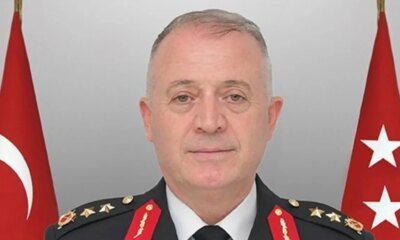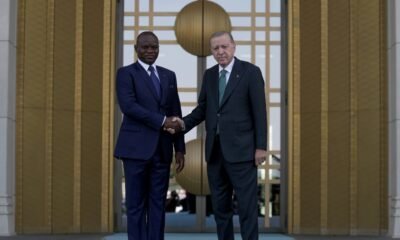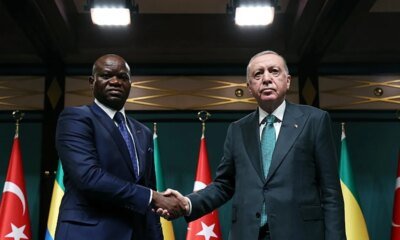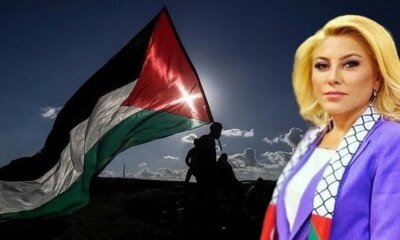Politics
Greece’s island militarization raises red flags for Türkiye
Greece on Monday announced radical plans to deploy what it called “self-sufficient” army units on the Aegean islands, some of which sit as close as 1,575 meters (5,165 feet) to Türkiye. The plan, part of the so-called “Agenda 2030,” aims to make front-line formations nearly autonomous, capable of growing their own food, generating their own energy and operating without needing orders or resupply from central command.
The move, primarily meant to counter Turkish elements while ensuring Greek supervision in the Aegean, raises several red flags for Türkiye and carries the risk of tempting a response that could upend already fragile balances between the Eastern Mediterranean neighbors.
Turkish defense experts argue Athens’ move, on islands that are required to remain demilitarized under international treaties, goes beyond a defensive upgrade and ventures into an aggressive posture aimed at Türkiye.
Retired Rear Adm. Cihat Yaycı, a prominent architect of Türkiye’s maritime doctrine “Blue Homeland,” called the plan “a clear violation of international law” and a “new manifestation of Greece’s lawless approach.”
The 1923 Treaty of Lausanne and the 1947 Paris Peace Treaty granted Greece sovereignty over 23 islands only on the strict condition that they would remain non-military in status.
“Greece has violated the very condition under which sovereignty was transferred,” he said in an exclusive interview with Daily Sabah, pointing to the deployment of military assets, airports, tanks and anti-drone systems as illegitimate.
“These developments must be read not as isolated defense upgrades but as part of a larger effort to undermine the non-military status of the islands through the use of civilians and pseudo-civilian structures,” Yaycı added. “This opens the door to contesting Greek sovereignty over these islands under international law.”
While Türkiye has long expressed concern over the militarization of islands in the Aegean, Yaycı emphasized that the new Greek doctrine signals an unprecedented shift toward operational independence, evoking not just legal concerns but potential security threats.
“This step by Greece constitutes a direct sign of aggression,” he said. “It has nothing to do with good neighborly relations or alliance solidarity within NATO.”
Echoing this assessment, Murat Aslan, a security analyst at Turkish think-tank Foundation for Political, Economic and Social Research (SETA) and former Turkish military officer, noted that the concept of “autonomous army units” poses a serious risk to Türkiye’s regional security.
“If any of these islands, especially those legally defined as demilitarized, are militarized under the guise of autonomous army units, it’s both unacceptable and dangerous for Türkiye,” Aslan told Daily Sabah. “Such moves could eventually interfere with maritime trade and freedom of navigation in the Aegean.”
Pattern of provocations
After a long period of tensions marked by disputes over irregular migration, the Cyprus dispute, energy exploration and territorial sovereignty in the Aegean, Ankara and Athens have been taking confidence-building steps for a fragile normalization of their relations since late 2023.
The normalization sustained momentum in the past two years, with talks between leaders as well as sporadic high-level meetings of top officials to discuss sources of dispute.
Yet, both countries stand firm in their maritime rights, which are still not fully agreed upon after decades of hostilities dating back to the post-World War I period.
The two experts argued that the Greek plan fits a larger pattern of provocations.
“Greece has doctrinally rehearsed offensive operations,” Aslan said, referencing recent military exercises involving amphibious landings on Türkiye’s western coast.
“If a country is purchasing equipment designed for breaching defenses rather than building them, that says a lot about their intentions,” he said.
Aslan pointed out that Greece has recently procured thousands of armored vehicles and advanced systems from the United States and Germany, often at no cost, through EU and NATO grants.
“Greece, rather than fighting with Türkiye, has a method of strengthening its defense without spending money and at the same time gaining the political support of other states, in other words, obtaining a security guarantee by ‘making a fuss,’” Aslan explained.
He said Greece’s strategy is to portray Türkiye as a threat, thereby securing foreign political guarantees and defense aid.
“They strengthen their defense posture without spending money and gain international backing in the process,” he said.
Countermeasures
Yet, for Ankara, the threat may be less about Greece’s actual military capacity and more about how these developments shift the political and legal playing field.
“Türkiye doesn’t perceive Greece as a current threat but rather a risk, especially if such maneuvers continue as a fait accompli,” Aslan explained. “It’s not just about matching moves militarily. It’s about protecting national rights under international law.”
Yaycı underscored this legal dimension, urging Türkiye to invoke Article 60 of the 1969 Vienna Convention on the Law of Treaties, which deals with reactions against treaty breaches and allows parties to suspend or terminate a treaty in response to prior violations by another party.
Invoking Article 60 would transform the Aegean islands issue from an ongoing diplomatic grievance into a formal treaty breach dispute with legal, territorial and possibly military implications. It would be one of the most serious legal steps Türkiye could take short of direct action.
“It’s time Türkiye loudly and unequivocally declares that Greece’s actions constitute such a breach,” Yaycı said, adding that Ankara should pursue legal, diplomatic, and if necessary, military countermeasures.
Türkiye’s military, he noted, is already well-positioned.
“We are among the top countries in defense exports, with advanced surveillance, command and weapons systems,” Yaycı said. “Türkiye is in the Super League; Greece is still playing in the amateur division.”
Beyond the bilateral tension, the Greek redeployment could also shake NATO cohesion in the region.
Both experts expressed concern that Greece’s growing defense ties with the United States and France might be used to reposition NATO’s eastern flank around Türkiye, effectively isolating Ankara.
“Greece’s cooperation with third countries on demilitarized islands contradicts NATO’s founding principles,” Yaycı warned. “It threatens alliance trust and undermines the balance in the Eastern Mediterranean. It may be an indirect attempt to push Türkiye out of the European and trans-Atlantic defense space.”
Aslan also pointed to the strategic significance of recent U.S. deployments in Greece, especially around Alexandroupoli (Dedeağaç), located just 40 kilometers (24.86 miles) from Türkiye’s border.
“The risk is that these forward bases are being positioned as part of a broader deterrence line, one not necessarily aimed at Greece’s defense but at Türkiye’s containment,” he said.
Still, Aslan cautioned against overreaction.
“Türkiye has many pressing regional issues, Syria, the Caucasus, the Russia-Ukraine war. Greece is just one piece of the puzzle,” he said. “But if Athens turns militarization into a long-term strategy, Türkiye will act, legally, diplomatically, and if required, operationally,” he said.
Politics
Erdoğan urges Gaza cease-fire in talks with Italy, Libya leaders
President Erdoğan called for an urgent cease-fire in Gaza and renewed support for a Palestinian state based on 1967 borders during a trilateral summit in Istanbul with Italy’s Prime Minister Giorgia Meloni and Libya’s Prime Minister Abdul Hamid Dbeibah, also addressing migration and regional cooperation, the Presidential Communications Directorate said.
The summit focused on cooperation between the three countries and regional issues.
During the meeting, Erdoğan underlined the importance of joint efforts by Türkiye, Italy and Libya in addressing the challenges facing the Mediterranean basin, including irregular migration. He stressed that long-term, sustainable solutions are needed to tackle the root causes of irregular migration, calling for greater multilateral coordination.
It was agreed that cooperation committees would convene first, followed by a leaders’ meeting to review decisions taken.
Highlighting Israel’s genocidal attacks in Gaza and the ongoing humanitarian tragedy, Erdoğan reiterated that the international community bears a major responsibility to ensure an immediate cease-fire and swift delivery of humanitarian aid to the region. He emphasized that a lasting solution can only be achieved through the establishment of an independent, sovereign and geographically contiguous State of Palestine within the 1967 borders, with East Jerusalem as its capital.
It was decided during the summit that the leaders would meet to discuss the decisions taken following the convening of the cooperation committees, the statement noted.
Rejecting international calls for a ceasefire, the Israeli army has pursued a brutal offensive on Gaza since Oct. 7, 2023, killing more than 60,000 Palestinians, most of them women and children. The relentless bombardment has destroyed the enclave and led to food shortages.
Libya’s National Unity Government seeks support for joint strategic projects
Libya’s Government of National Unity also issued a statement after the summit, stating that the talks addressed regional cooperation, stability, and economic integration in the Mediterranean, emphasizing the importance of supporting joint strategic projects.
The statement noted that economic cooperation opportunities were also discussed at the summit.
It emphasized the importance of connecting Libya to regional projects in the Mediterranean, as well as strengthening partnerships in energy, oil and gas, and infrastructure; investing in ports; developing electricity networks; and supporting joint strategic projects.
Noting Dbeibah’s call for increased regional coordination in combating smuggling networks and illegal activities at the summit, the statement said the Libyan premier also urged a quadripartite ministerial meeting consisting of Libya, Türkiye, Italy, and Qatar to initiate joint projects in this regard and to combine efforts on priority issues.
Politics
Italy praises Türkiye’s cooperation in migration management
Italy on Friday hailed Türkiye’s cooperation in curbing irregular migration, saying it has delivered “excellent results,” according to an official statement.
In a statement, the Italian government said that Italian Prime Minister Giorgia Meloni, Turkish President Recep Tayyip Erdoğan, and Prime Minister of Libya’s National Unity Government Abdul Hamid Dbeibah discussed strengthening cooperation to address common challenges, beginning with the management of irregular migration flow.
It came during the three leaders’ trilateral summit in Istanbul.
During the meeting, Meloni emphasized “the excellent results achieved in this regard with Türkiye,” as well as the opportunity to build on the lessons learned, including by applying them to support the Libyan Government of National Unity’s migration efforts.
“In this context, President Meloni discussed with her interlocutors a series of measures to fight international criminal networks of human traffickers, improve work to prevent irregular movements, and support Libya in managing the migration pressure it is facing,” it added.
The statement mentioned that Meloni also reaffirmed Italy’s commitment to Libya’s stability, unity, and independence, as well as its support for a political process led by Libya and facilitated by the United Nations that can result in elections.
The three leaders agreed to immediately resume work on a technical level to identify concrete actions to be carried out collaboratively within a clearly defined time frame.
According to a statement from Türkiye’s Communications Directorate, the Turkish president emphasized the importance of cooperation among the three countries in addressing the Mediterranean region’s challenges, including irregular migration movements.
Following the summit, Libya’s Government of National Unity issued a statement, stating that the meeting addressed regional cooperation, stability, and economic integration in the Mediterranean, stressing the importance of supporting joint strategic projects.
Politics
‘Israel intentionally stalling cease-fire talks to weaken resistance’
Israel is deliberately prolonging cease-fire talks to weaken Palestinian resistance and force Gazans from their land, Foreign Minister Hakan Fidan said as he met with a Hamas delegation in Istanbul, diplomatic sources said.
Speaking with Hamas Shura Council head Muhammad Darwish, Fidan slammed Israel for pursuing a “genocide policy” by starving Gaza’s population and acting in bad faith in negotiations. He said such tactics show the Netanyahu government has no genuine intention of reaching a cease-fire.
The minister stressed that Israel’s attempts to displace Gaza’s population and annex the West Bank are unacceptable, reiterating Türkiye’s support for continued talks.
Fidan also noted growing global public support for Palestine, with more countries recognizing the State of Palestine and Israel facing increasing isolation. He reaffirmed that Türkiye’s support for the Palestinian cause will remain strong.
Politics
Erdoğan, Meloni, Dbeibah hold trilateral summit in Istanbul
President Recep Tayyip Erdoğan on Friday received Italian Prime Minister Giorgia Meloni and Libyan Prime Minister Abdul Hamid Mohammed Dbeibah in Istanbul for a cooperation summit.
The surprise meeting at Dolmabahçe Palace on the banks of the Bosporus focused on energy exploration in the Mediterranean, irregular migration flows, as well as the political process to restore stability in Libya, media reports said.
The summit is “part of the ongoing coordination between Libya, Türkiye and Italy, aimed at promoting common approaches that serve the interests of the region’s peoples and contribute to supporting stability and international cooperation, according to a statement released by the Libyan Government of National Accord (GNA).
In June 2025, Türkiye and Libya signed a deal for joint geological and geophysical surveys across four offshore Mediterranean zones. The agreement includes a 10,000‑kilometer (6,200-mile) seismic campaign and data processing within nine months, signaling a strategic deepening of Ankara‑Tripoli ties in hydrocarbons.
Türkiye’s expertise and seismic capabilities are set to play a pivotal role in unlocking Libya’s untapped reserves, estimated among Africa’s largest, while Italy remains a key downstream partner through pipelines like Greenstream linking Libya to Sicily.
The talks also came against the backdrop of mounting migration pressures, as all three nations sit along key routes into the European Union for people fleeing war and poverty. Libya remains the primary departure point, with some 21,000 migrants reaching Italy this year – an 80% increase compared to 2024, according to Italian daily Il Sole 24 Ore.
As two NATO allies, Türkiye and Italy have strengthened their partnership in recent years, playing complementary roles as regional bridge-builders. Cooperation has expanded in trade, defense and diplomacy, with both nations prioritizing stability in the Black Sea, the Middle East and North Africa.
Earlier this year, Italian defense giant Leonardo, one of Europe’s largest defense industry companies, and Turkish drone powerhouse Baykar signed a cooperation agreement, highlighting their interest in intensifying defense cooperation.
Diplomatic engagements have increased, with Erdoğan and Meloni holding frequent phone discussions. In the Black Sea and the Middle East, Türkiye’s mediation efforts for the wars in Ukraine and Gaza align with Italy’s priorities for regional stability.
Erdoğan last visited Rome in late April for the fourth intergovernmental summit between the two countries. He and Meloni discussed geopolitical crises, as well as the present and future of Libya.
In a joint declaration, the sides had voiced their support for a U.N.-facilitated, Libyan-owned political process aimed at preserving Libya’s unity, security and sovereignty.
Türkiye’s role in Libya
Libya has seen more than a decade of stop-start conflict since a NATO-backed revolt toppled longtime dictator Moammar Gadhafi in 2011, with a myriad of militias forming opposing alliances backed by foreign powers.
The country is currently governed by two rival administrations: the U.N.-recognized GNU led by Dbeibah in Tripoli, which controls the western part of the country, and the government of Osama Hammad, appointed by the parliament, which operates out of Benghazi and governs the eastern region and parts of the south.
Efforts led by the U.N. to hold parliamentary and presidential elections have repeatedly stalled, prolonging the country’s political deadlock and exacerbating the security situation in the oil-rich nation.
Türkiye and Libya have seen closer ties in recent years, especially after the signing of security and maritime boundary pacts in November 2019, along with Türkiye’s aid to help the internationally recognized Libyan government push back putschist Gen. Khalifa Haftar’s forces.
Türkiye supported the U.N.-recognized legitimate government in Tripoli against the eastern-based illegitimate forces led by Haftar, who was backed by Egypt, France, the United Arab Emirates (UAE) and Russia.
Türkiye’s support for the Tripoli government was critical in repelling the Haftar forces’ offensive to capture the capital, Tripoli, and led to a period of stability that resulted in the formation of a unity government.
Politics
Istanbul to host next year’s inter-parliamentary assembly
Istanbul will host the 152nd Assembly of the Inter-Parliamentary Union (IPU) next year, Parliament Speaker Numan Kurtulmuş announced during a press briefing at the U.N.’s Geneva headquarters.
“It will be a great honor for us, as Türkiye, to have these people, the parliamentarians around the world, in Istanbul,” Kurtulmuş said Wednesday, confirming that the hosting agreement had just been signed.
The announcement came during an Association of Accredited Correspondents at the United Nations news briefing in Geneva, where Kurtulmuş was attending this week’s Sixth World Conference of Speakers of Parliament, organized by the IPU.
The IPU’s 151st Assembly will also take place in Geneva on Oct. 19-23 with the theme of upholding humanitarian norms and supporting humanitarian action in times of crisis.
Gaza genocide
At the briefing, Kurtulmuş described Israel’s actions in Gaza as “the biggest genocide in modern times.”
He accused Israel of deliberately using famine as a weapon and criticized the international community, particularly the U.N., for its failure to act.
“We are gathered at the U.N. facility premises today, and I’d like to ask, where is the United Nations today?” he said. “If they cannot prevent the danger of 40,000 babies dying due to hunger, then what good are they for?”
Calling for immediate international intervention, he added: “The most immediate action that is needed today is stopping Israel as soon as possible.”
He also pointed to a growing shift in the global political landscape, noting that even countries traditionally supportive of Israel are beginning to change their stance.
“Even those countries that so far always appeared to provide support to Israel in an unquestionable way, that have sided with Israel with no questions asked, started to say that ‘what you are doing in Gaza is a genocide, you have to end it, and if you do not end it, then we will recognize Palestine,'” he said.
Taking a question from Anadolu Agency (AA), Kurtulmuş elaborated on Türkiye’s effort to build a global parliamentary platform, the Group of Parliaments in Support of Palestine.
He said they had invited all national parliaments to join the initiative during the parliament speakers’ meeting this week.
The initiative held its first meeting in Istanbul, and according to Kurtulmuş, it was “quite fruitful” thanks to in-depth discussions.
Kurtulmuş expressed hope that the platform would expand beyond Muslim or Middle Eastern countries to include parliaments from Europe, Latin America, Africa and Asia.
He added that the “common voice that is rising on the streets, reflecting the beliefs of humanity,” should also be reflected in legislative bodies, emphasizing that there is “a lot to do in this regard.”
Additionally, he noted that Israel’s military campaign extends far beyond Gaza and accused it of violating the sovereignty of multiple neighboring countries.
“They have bombarded Lebanon so far. They have bombarded Yemen so far, Syria also, Iran also,” he said. “But no matter how aggressive they are or how they act, I believe they are wise enough not to mess with Türkiye.”
He said Israel’s actions reflect a long-term ambition to divide and destabilize the region under the so-called “Promised Land” doctrine and that global public opinion is increasingly turning against these efforts, even in countries that have long supported Israel.
Russia-Ukraine talks
On the war in Ukraine, Kurtulmuş stressed that Türkiye has maintained communication with both Kyiv and Moscow from the very beginning and continues to pursue shuttle diplomacy between the two sides.
“Since the beginning of this war, Türkiye has always been one of the rare countries in the world that was able to maintain dialogue with both countries,” he said.
He told how delegations from Russia and Ukraine came together in Istanbul in March 2022 – just after the war started – and signed a draft agreement but were ultimately unable to finalize it.
“When the time came for them to sign the actual final peace agreement, they were not able to settle in peace, since certain countries did not side with peace and they wanted the process to continue,” said Kurtulmuş.
Kurtulmuş underlined that Türkiye believes a resolution is only possible through direct talks that produce a “fair and acceptable” peace.
“The way to peace is a fair one, not an imposed one,” he said, adding that Türkiye had continued its efforts through three more meetings in Istanbul since this June.
He voiced hope that a fourth round of talks would bring presidents Volodymyr Zelenskyy of Ukraine and Vladimir Putin of Russia to Istanbul to “pave the way for a permanent peace between the two nations.”
“Personally, speaking, I am rather optimistic in this regard, because every war comes to an end, every conflict comes to an end … and no matter what happens, there are no winners in wars, and it’s the people, it’s the nations that lose all the time due to wars and due to conflicts.”
The parliament speaker also criticized Western sanctions on Russia.
“Blockades and embargoes never prevail and never yield results … these kinds of practices do not stop the regimes or do not penalize the regimes. Instead, they penalize the civilians, the people.”
On Syria, he called for a political solution that guarantees the rights of all ethnic and religious groups and safeguards the country’s territorial integrity.
“People coming from different backgrounds in Syria should be able to gather under one single flag and act as members of this one single nation,” he said, warning against both internal remnants of the ousted Bashar Assad regime and foreign interference that threaten to undermine stability.
Istanbul as peace hub
Kurtulmuş said Türkiye’s neutral stance had helped make Istanbul a hub for international negotiations, not only on Ukraine but also on other global conflicts.
“We are quite pleased to see that Istanbul is becoming a center of negotiations,” he said. “This is thanks to the neutral and structuring role that Türkiye is assuming so far.”
He underlined the unique role of parliaments in diplomacy, saying legislative channels can act more flexibly than governments in promoting peace.
“Parliaments are more advantageous to make progress in peace talks,” he said, noting active dialogue with both the Ukrainian and Russian Parliaments.
Kurtulmuş also said rising global awareness – both on the streets and in legislative institutions – could help shift the balance toward justice and lasting peace.
Politics
Parties unveil members for key committee on terror-free Türkiye
Ahead of its formal inauguration, a parliamentary committee on the terror-free Türkiye initiative is taking shape.
The Republican People’s Party (CHP) and the Justice and Development Party (AK Party) on Thursday announced the names of their parliamentarians who will join the committee.
The committee is expected to begin work next week and will address the multiple aspects of the initiative that have been discussed so far through statements from politicians. The first concrete step in the initiative, which involves disarmament of the PKK terrorist group, came earlier this month when a group of terrorists burned their weapons in a symbolic ceremony. Although a symbolic gesture, it is expected to gain momentum in the coming months and end decades of violence that claimed tens of thousands of lives.
Media outlets reported that the CHP’s committee members will include Deputy Parliamentary Group Chair Murat Emir, Deputy Chairs Gökçe Gökçen and Murat Bakan and lawmakers from Istanbul, Diyarbakır, Ankara and Muğla. Among them are Türkan Elçi, the widow of Diyarbakır Bar Association’s former Chair Tahir Elçi, who died in 2015 in crossfire during a shootout between police officers and PKK members and Sezgin Tanrıkulu, a prominent parliamentarian who has often made headlines for his heavy criticism of counterterrorism efforts.
The CHP supports the terror-free Türkiye initiative, though it criticizes many aspects of the process. Party Chair Özgür Özel said earlier that they would join the committee if it applies “qualified majority” rule and their condition appears to be accommodated. Other parties that have confirmed their intention to join the committee are the Labour Party (TIP) and the Democratic Left Party (DSP). The Nationalist Movement Party (MHP) had already announced its lawmakers for the committee, around the same time that the Peoples’ Equality and Democracy Party (DEM Party) unveiled its list of lawmakers. The MHP launched the terror-free Türkiye initiative last year when its leader Devlet Bahçeli called on PKK’s jailed ringleader Abdullah Öcalan to urge his group to lay down arms. Öcalan agreed and the PKK declared its dissolution last May before it started abandoning arms earlier this month. The DEM Party, known for its intricate links with the PKK, played a key role in the initiative, serving as messenger between Öcalan and political parties during visits to the PKK leader, party leaders and President Recep Tayyip Erdoğan.
The AK Party’s parliamentary group chair, Abdullah Güler, announced the names of their 21 committee members as they presented the list to the office of the Parliament speaker on Thursday. Among AK Party lawmakers who will serve on the committee are former Justice Minister Abdulhamit Gül, Mustafa Şen, Kürşat Zorlu, Hüseyin Yayman, Cüneyt Yüksel, Sunay Karamık, Selami Altınok, Kemal Çelik, Mehmet Sait Yaz, Mahmut Atilla Kaya, Şengül Karslı, Mehmet Şahin, Ayşe Böhürler, Radiye Sezer Katırcıoğlu, Tahir Akyürek, Ali Kıratlı, Cevahir Asuman Yazmacı, Gökhan Diktaş, Burhan Kayatürk, Abdurrahman Babacan and Ersan Aksu. Yüksel is a prominent academic who taught law before joining Parliament and already heads a parliamentary delegation representing Türkiye in international courts in the country’s efforts to hold Israel accountable for its war crimes in Gaza. The AK Party’s list is diverse in terms of constituency, containing lawmakers from all regions of Türkiye, including southeastern Türkiye, which has heavily suffered from PKK attacks for decades.
The Free Cause Party (HÜDA-PAR), which endorsed President Erdoğan in the 2023 presidential elections, announced that its chair, Zekeriya Yapıcıoğlu, will serve as a committee member, while the New Path (YY), an alliance of three smaller political parties that pursue right-wing policies, presented the list of three lawmakers to represent them at the committee on Thursday.
Speaking to reporters on Wednesday, Parliament Speaker Numan Kurtulmuş, who will chair the committee, said it would begin work in the first week of August and would operate in a manner that ensures all parties have a say in the process. Kurtulmuş confirmed the qualified majority rule for the decisions of the committee. He noted that the initiative had now passed to Parliament as disarmament began.
“Now we have to move forward very sensitively,” he said.
He said the committee would draft several legal regulations based on the needs of the initiative. “One of the most important issues here is maintaining transparency in the committee’s work, heeding public concerns. The golden ratio for us, the balance of this work is prioritizing the dignity of Turks and the pride of Turks,” he said.
Proponents of the initiative often stress Turkish-Kurdish unity to counter the terrorism threat, as the PKK long exploited Kurds to draw support for its so-called cause to carve out an autonomous region for the community in the southeast. Kurtulmuş stated that the committee would hear “many people.”
“We will hear from nongovernmental organizations, jurists and everyone who studied this and has a stake in this. It will not be a political entity. This is an initiative involving the entire nation and efforts to eradicate the most important problem in the history of the republic,” he said.
He also stated that the committee would draft bills and present them to Parliament’s general assembly, which will then decide on whether to pass them.
-

 Daily Agenda3 days ago
Daily Agenda3 days agoIstanbul Provincial Gendarmerie Commander Yusuf Kenan Topcu was promoted to Lieutenant General
-

 Sports2 days ago
Sports2 days agoPiastri, Norris go head-to-head as McLaren leaves Verstappen in dust
-

 Politics2 days ago
Politics2 days agoErdoğan receives Gabon President Nguema in Ankara
-

 Daily Agenda3 days ago
Daily Agenda3 days agoGaza message from President Erdoğan: Patience Stone is about to crack
-

 Daily Agenda3 days ago
Daily Agenda3 days agoDARKING SCANDAL IN ICRYPEX – MAHMUT ÖVÜR
-

 Daily Agenda2 days ago
Daily Agenda2 days agoLast minute | New development in IMM operation! They were referred to the courthouse
-

 Politics3 days ago
Politics3 days agoTürkiye signs Hague Group declaration on Palestine
-

 Daily Agenda3 days ago
Daily Agenda3 days agoŞebnem Bursalı from the AK Party: The recognition of Palestine is no longer a choice, it is a debt of humanity.




